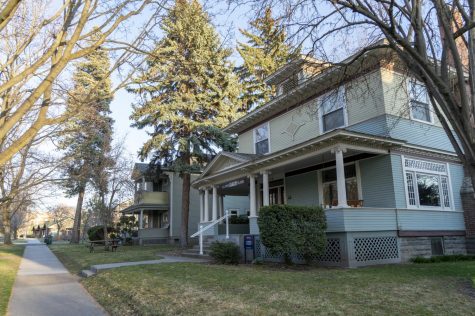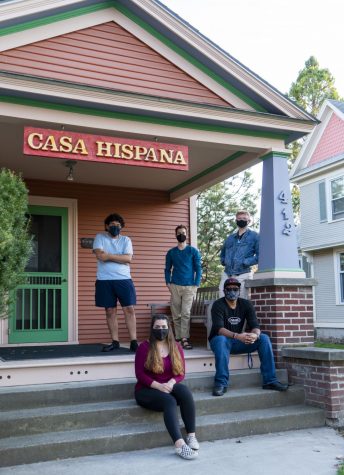Masked and distanced: Community-centric Interest House policies surprise residents
March 18, 2021
Living in the Interest House Community (IHC) this semester is looking quite similar to living in on-campus residence halls, much to the surprise of IHC residents. While there are nine active standalone houses this semester, under college policy, the IHC is considered a residence hall.
Emma Lungren, the Residence Director of the IHC, explained how the COVID-19 protocols in place within the IHC don’t look much different from the rest of campus.

“COVID protocol is standard all across campus, so things that are enforced in Prentiss, for example, are also enforced in the IHC,” Lungren said. “The houses aren’t considered pods, so because of that folks still wear masks in public spaces and try to distance from one another. It’s just like other halls, except there is, one could say, more intentionality around community.”
One of the staple forms of community-building in the IHC is house dinners, which occur every night. Some houses get together in their living space for dinners while wearing masks when not eating and distancing from one another. Other houses are opting for fully virtual dinners.
Every week, two interest houses are paired together for an inter-house dinner. Nomonde Nyathi, a sophomore resident of the Multi-Ethnic Center for Cultural Awareness (MECCA) house, explained how house dinners look in her household.
“Sometimes we have them over Zoom, or sometimes we have them in the dining room because we can do that,” Nyathi said. “If we’re doing house dinners with the French house, my housemates and I cannot be around the same table and the same computer. We all have to be in our separate rooms and all be on Zoom.”
Resident Advisers of the IHC have reported that enforcing COVID-19 policy within their houses has not been an issue. Alyssa Ortiz, the RA of La Casa Hispana, expressed that based on conversations with her residents, they all acknowledge the importance of the policy in place.

“My residents understand the COVID protocols Whitman has put into place and have followed the protocols really well, even when they feel tedious,” Ortiz said. “There are times when it’s a bit inconvenient, like when there are more than two people in the kitchen at a time trying to get food from the fridge or dishes from the cabinet, but they wait a few minutes until the space is less crowded.”
While residents are compliant with IHC rules, they are also surprised about the protocols in place. Duncan Kubalak, a sophomore resident of the Global Awareness House, explained that the rules initially came as a surprise to him and his housemates, but that they were willing to follow them. Nyathi similarly commented that she needed to adjust to the rules in place when she first moved in this semester.
“I remember thinking, ‘okay, but what is the point of me doing that if I live with you guys,’” Nyathi said. “It just didn’t make any sense. I expected us to be a community that could just vibe out and get along, not for people to be separated.”
Kubalak is living in a house with only two other residents, and their RA lives in another house. In these circumstances, it doesn’t seem logical to him to be under the same restrictions as residence halls.
“I feel like in this case, it would make more sense for all of us to operate like a pod,” Kubalak said. “My fellow residents and I are all very COVID-conscious, so we don’t necessarily mind taking the precautions even if in this case it doesn’t necessarily make sense.”
Ortiz added that while she has not had trouble enforcing policy among residents, the IHC rules were not initially communicated clearly to RAs.
“Before coming back to campus for training, I had been under the impression that living in the houses meant each house would be treated as a pod,” Ortiz said. “However, it wasn’t until RA training in the very beginning of January when Residence Life informed us that the houses would be functioning like any other residence hall in regards to the COVID protocols.”
Kubalak added that as a resident, he was also unaware of the policy that would be in place before coming back to campus.
“I did receive IHC-specific information about the initial quarantine period, but as for the policies we are following now, I didn’t learn about those until I arrived on campus,” Kubalak said.
Nancy Tavelli, Director of Residence Life and Housing, said IHC residents may have made premature assumptions that living conditions would be similar to how they were in the fall semester while campus was closed.
“All Interest House residents and the entire Whitman Community received the same communications,” Tavelli said. “The information was sent out multiple times. It is possible that because the houses were super small (many at 2-3 residents) in the fall and were not operating as Interest Houses that some thought the spring would be the same.”
Lungren added that the standalone structures of IHC houses could have been misleading, but the houses are not separated from the rest of campus life.
“I think some confusion also stemmed from the assumption that since IHC houses can be seen as ‘households,’ they could be assumed to be separate from the rest of campus rules,” Lungren said. “It is also important to note that while houses in the IHC are a source of community, they are by no means the only way that students socialize. The concept of creating a house as a ‘bubble’ or pod wouldn’t work because students have classes in person and friends in other halls and houses.”
However, students living in off-campus houses are also attending classes in person but are under no clear obligation to remain socially distanced from their housemates.
Even with the current protocols in place, community is still being built in the Interest Houses. Lungren shared a story of bonds being formed between housemates in La Casa Hispana.
“They took an evening to slide down some of the stairs on mattresses and still do silly fun things, but such that they are not close to one another when they do it, so still inclusive and fine but keeping policies in mind,” Lungren said.





